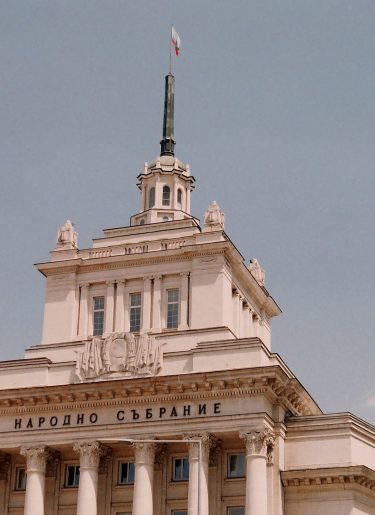
Bulgaria has faced five parliamentary elections over the last two years resulting in an almost constant state of political uncertainty since March 2021. One of the 2021 elections led to the creation of an unstable government which lasted only seven months. For the rest of the period until June 2023, the country was mainly governed by caretaker governments appointed by the President against the background of a dysfunctional Parliament which was mostly incapable of adopting legislative changes.
After the last elections in April 2023, the two pro-Euro-Atlantic parties agreed to form a government with a rotating premiership intended to last for 18 months. The members of the government were approved by the Parliament on 6 June 2023.
The Prime Minister has stated that the priorities of the new government include a constitutional reform to implement changes to the prosecutor’s office and the supreme administrative body of the judiciary (the Supreme Judicial Council), adopting the Euro as Bulgaria’s currency, joining the Schengen area, passing a state budget with a deficit of 3% without raising taxes, adopting changes to the election rules and appointing new members of regulatory bodies whose mandates have expired.
As far as compliance with the EU framework is concerned, from a total of 108 measures necessary for alignment of Bulgarian legislation with the EU requirements, in 2023 Bulgaria has adopted only 39 measures. This means that more than 60% of necessary EU-related measures remain outstanding and unaddressed at national level. In the EU alignment plan for 2023 there are a total of 53 measures aimed at addressing 44 infringement procedures initiated against Bulgaria under the Treaty on the Functioning of the European Union. However, it is expected that the newly elected government and the parliamentary majority behind it will address at least the most urgent measures in the near future.
The Bulgarian economy performed relatively well during the COVID-19 and energy crises despite high inflation rates and political uncertainty. While the initial surge in inflation in 2021 was largely driven by external factors such as high energy and food prices, domestic factors such as rapid wage growth created the potential for second-round effects and persistent inflation.
The banking sector is dominated by foreign-owned banks and still remains profitable and well capitalised. The level of new loans continued to grow strongly in 2022, notably in the mortgage sector.
In 2022, the European Commission gave its green light to Bulgaria’s Recovery and Resilience Plan, which aims at addressing the key challenges the country faces related to the green and digital transition, the business environment, social inclusion, and access to quality education, training and healthcare. In June 2022, the plan’s total allocation amounted to EUR 5.7 billion in grants (which represented around 8% of GDP in 2021). 58.9% of the plan’s total allocation contributes to climate objectives and 25.8% to digital objectives.
In addition to support from the Recovery and Resilience Plan, Bulgaria will also benefit from sizeable EU cohesion funds (EUR 11 billion, representing around 13% of GDP in 2022).
The swift implementation of the Bulgarian Recovery and Resilience Plan and cohesion policy programmes is of key importance for the future economic development of the country.
Bulgaria did not escape the global ‘post-COVID syndrome’ affecting M&A transactions. The local market saw growth after the lull in 2020. In 2021, in common with other countries in the region, there was a jump in M&A activities in Bulgaria, which approached the levels from the years before the COVID-19 crisis. Due to general, pandemic-related uncertainty in 2020, some investment decisions were postponed, and many sale processes were prolonged; ultimately, many of these were implemented and effectively closed in 2021.
From this perspective, 2021 became, to a certain extent, a ‘catch-up’ year. Considering the gradual recovery from the most severe stage of the COVID-19 pandemic, which saw economic activity restart in a number of sectors, regional and international investors have regained their focus. Concerns for the preservation and sustainability of existing businesses have given way to an appetite for expansion through the acquisition of new companies. In 2021, the energy and telecommunications sectors were the main traditional deal drivers, with the transport infrastructure, software technologies, e-commerce and real estate sectors also playing a significant role. The M&A market also saw two major transactions: one in the banking sector and another in the telecom sector. Ultimately, both deals were closed in 2022.
With the number and volume of deals reaching record levels in 2021, 2022 was marked by a serious decline globally and at European level. The high rates of inflation, rising credit costs and geopolitical uncertainty hampered deal making in 2022 and sent global mergers and acquisitions activity down by nearly 30% from 2021 levels.
After an unusually active 2021, the M&A market stabilised in 2022. There was a downward trend in deal activity, but this activity was still above pre-pandemic levels. Similar to global markets, the local M&A market was deeply affected by the geopolitical crisis caused by the war in Ukraine, including the resulting energy crisis, social and economic crisis, delays and supply chain interruptions in certain sectors, galloping inflation, rising interest rates, the refugee crisis, and the sanctions imposed on Russia.
These international and geopolitical pressures were compounded by domestic concerns. Considerable internal political tension was caused by the impossibility of forming a stable government in Bulgaria. In the last quarter of 2022, there was a slowdown, mainly among buyers who were more cautious in making decisions, due to global and domestic factors which drove increased financing costs. Equity funds, for example, became much more selective, though this did not lead to a dramatic drop in deals. Against this background, the development of the M&A sector in 2022 was not as successful as in the previous year.
European projections for 2023 were pessimistic, and recession has been forecast for one third of the world economy, including half of the European Union. However, forecasts for the development of the M&A sector in Bulgaria in 2023 are for activity despite deepening crises at all levels, leading to more difficult and more expensive financing of transactions.
In 2023, the banking sector is preparing for the finalisation of two transactions initiated in 2022. According to experts’ opinions, there are also more initiatives for moving of the production operations of global companies from China to areas with better security of supply, and therefore production infrastructure in the Balkan EU countries are becoming attractive targets for acquisition.
Analysts point out that recent political uncertainty around the formation of a stable government did not seem to have a very significant negative impact on external investors’ attitudes towards Bulgaria as an investment destination. In the longer term, changes in policy direction as well as the successful implementation of actual reforms could be expected to contribute to the country’s attractiveness for investors.
A number of major projects are currently being considered, presenting important opportunities in Bulgaria.
This article was originally published as part of Bulgaria’s entry in the ‘Chambers & Partners Doing Business In… 2023 Global Practice Guide’. The M&A trends section includes market information, analysis, assessments and expert opinion from Capital Bulgaria (Economedia Group).
To find out more about business transfers
